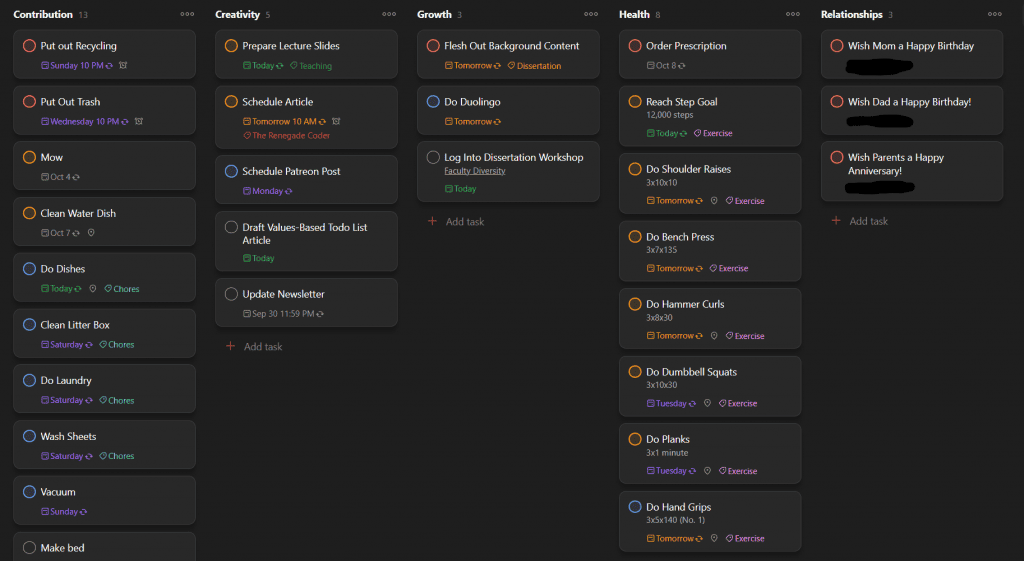Right now you’re probably wondering why I’m not covering code today. That’s because I had a pretty big epiphany in my day-to-day workflow that has helped me find a bit more meaning in my work. Amid all the chaos of my daily TODO list, I was able to find order by sorting my tasks by my values. Maybe you’ll find some “value” in this tip as well.
Table of Contents
- TODO List Nightmares
- Introducing a Values Framework
- Grouping Your Tasks by Your Values
- Falling Back on Old Habits
TODO List Nightmares
In my day-to-day, I balance a lot of tasks, such is the life of an adult. For instance, I am a PhD candidate, so I try to work in dissertation writing just about every day. I also run this site, which I commit some time each week to creating an article like this one. On top of that, I’m a lecturer, so a lot of my day-to-day involves helping students. And of course, I have a family and a home to take of—not to mention myself!
As a result, I usually have around 10 tasks I try to get done each day. For example, here’s what my TODO list looks like for tomorrow:
- Flesh out background content
- Schedule this article
- Do bench press
- Do hammer curls
- Do shoulder raises
- Do duolingo
- Do hand grips
- Reach step goal
- Log into dissertation workshop
- Make bed
As you can see, a lot of these tasks are exercise related. I’ll talk more about why that is later, but you can imagine that other tasks might sprinkle in from time to time, such as:
- Do laundry
- Clean dishes
- Vacuum
- Wash sheets
- Put out recycling
- Put out trash
- Schedule patreon post
- Check GitHub for pull requests
- Do dumbbell squats
- Do planks
- Update newsletter
- Mow
- Clean water dish
- Order prescription
- Write letter of recommendation
And there are plenty of tasks that I don’t explicitly include in my TODO list, which I probably should, like checking my email.
As you can imagine, having a lot of tasks to complete can lead to decision fatigue around which to do and when. For a long time, I used to just sort my tasks by responsibility (e.g., teaching, research, life, etc.), but this doesn’t really aid you in choosing the tasks. As a result, I would often prioritize the tasks by most urgent or most important, but these are short-term metrics that are usually imposed by others.
So, what if you want to take control back in your life? Then, I have a subtle trick you can try to employ in your own TODO lists.
Introducing a Values Framework
Some time ago, I got really interested in the concept of values. This was during a transitional period in my life where I was stuck in a job that I hated, and I was looking inward to figure out what I really wanted to do with my life.
At these points in time, the desperation can cause you to lean into resources and role models that are not really all that great. For instance, around that time, I was finding my way through a variety of role model-style figures like Jordan Peterson, Dave Ramsey, Ben Shapiro, Sam Harris, Noam Chomsky, and Joe Rogan—none of whom I’d really recommend modeling your life after regardless of political affiliation.
Fortunately, I didn’t go tumbling down the alt-right rabbit hole, but I did find myself in a brief stint with minimalism. Specifically, I grew quite fond of The Minimalists , whose podcasts led me to reflect a bit on my values:
, whose podcasts led me to reflect a bit on my values:
I don’t care much for them anymore, but they introduced me to a values framework that helped come to terms with my own values. According to their framework, all of us have similar foundational values (i.e., values which are “unshakeable”), which they claim are some variation of the following:
that helped come to terms with my own values. According to their framework, all of us have similar foundational values (i.e., values which are “unshakeable”), which they claim are some variation of the following:
- Contribution
- Creativity
- Growth
- Health
- Relationships
While they don’t explicitly define these terms in the article linked above, I tend to think of them as follows:
- Contribution is about giving back to your communities.
- Creativity is about following your passions.
- Growth is about improving yourself.
- Health is about maintaining physical and mental wellness.
- Relationships are about maintaining connections with friends and family.
Now, The Minimalists argue that there are also three more degrees of values, which you can define for yourself. However, they argue that not paying attention to these five foundational values can lead you to feeling unfulfilled. And as it turns out, an easy way to verify if you’re ignoring any of your foundational values is to sort your TODO list by them.
Grouping Your Tasks by Your Values
Personally, I use Todoist [what I wouldn’t do for an affiliate link right now], but there are probably 1,000 different TODO list apps out there. Alternatively, you can always opt for an old school pen and paper TODO list. Regardless, as long as your TODO list tool lets you sort your tasks into groups, you can start to organize your tasks around your values.
In Todoist, I’m able to do this by creating a “Project” and using the “Board” view. The “Board” view is handy because you can see all five of your foundational values in a row. This gives you the ability to visually see which of your values you’re neglecting—and you know I’m a sucker for data visualization.

Immediately, you can see that I pour a lot of myself into contribution, through teaching and chores, and health, through exercise. Meanwhile, I’m not doing a ton for growth or relationships, both of which could use a little attention.
Since coming up with this little hack for myself, suddenly tasks that I normally wouldn’t want to do, feel kind of good and even fun. Given that my students always want to know why they’re doing something, it makes sense that I might also want to know why I’m doing something.
Therefore, sorting your tasks like this allows you to give yourself the rationale for a particular task. And even better, it allows you to cast aside tasks that don’t fit into this framework—within reason, of course. For example, I just added the “check emails” task into my TODO list, but I’m not sure that checking email is fulfilling since it doesn’t really fall into any of these buckets. In some sense, I could argue it’s a form of contribution, but it’s mostly wasted time.
Falling Back on Old Habits
When moving my TODO list to the new values-based format, I found that I somewhat missed being able to tell where a task originates. For instance, I like being able to know if a task is for work or for school, and I lose that ability when the tasks are organized into values-based buckets.
Luckily, there’s a nice little workaround in Todoist which involves applying labels to each task. As a result, I’m able to label a task as “exercise” or “chores”, and then I can search up all the tasks with that label. Even better, tasks can have multiple labels, so they’re no longer bound to their groupings (sort of like GitHub issue labels). On top of that, you can quickly see which types of tasks are contributing to which values at a glance, as you can see in the screenshot above.
Of course, even if you don’t organize your tasks like this, I think it helps just to keep these foundational values in the back of your mind. And surely there are other effective ways to make a TODO list. In fact, I think The Minimalists have their own framework for that as well .
.
With all that said, I think I’m going to call this one a day and get to my next task! Thanks again for reading. If you found value in this at all, consider heading over to my list of ways to grow the site. Alternatively, you can check out these related articles:
- Why I Deleted Most of My Social Media
- The Renegade Minimalist
- Steps Toward Minimalism: How I’m Downsizing and Simplifying My Life
As always, take care!
Recent Posts
It's July 2024, and I have three chapters of my dissertation drafted! Two more and we'll be ready to defend.
In growing the Python concept map, I thought I'd take today to cover the concept of special methods as their called in the documentation. However, you may have heard them called magic methods or even...

